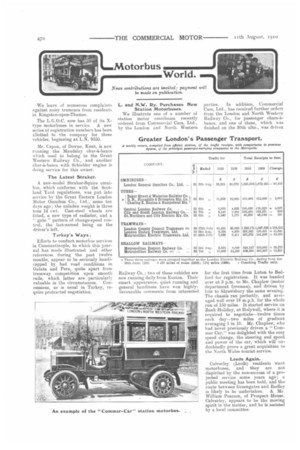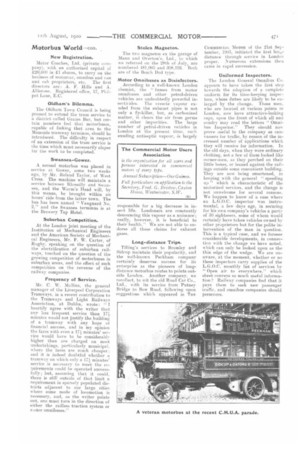L Motorbus
Page 8

Page 9

If you've noticed an error in this article please click here to report it so we can fix it.
World.
'We learn of numerous complaints against noisy tramcars from residents in Kingston-upon-Thames.
The L.C.O.C. now has 50 of its Xtype motorbuses in service. A. new series of registration numbers has been allotted to the company for these vehicles, beginning at L.N. 9550.
Mr. Capon, of Downe, Kent, is now running the Maudslay char-k-bancs which used to belong to the Great Western Railway Co., and another char-ii-bams with Schiebler engine is doing service for this owner.
The Latest Straker.
A new-model Straker-Squire omnibus, which conforms with the Scotland Yard regulations, was put into service by the Great Eastern London Motor Omnibus Co., Ltd., 8911213 ten days ago; the unladen weight is three tons 14 cwt. Cast-steel wheels are fitted, a new type of radiator, and a " gate " pattern of change-speed control, the last-named being on the driver's left.
Turkey's Ways.
Efforts to conduct motorbus services in Constantinople, to which this journal has made illustrated and other references during the past twelve months, appear to be seriously handicapped by bad road conditions in Galata and Pera, quite apart from tramway competition upon smooth rails, which latter are particularly valuable in the circumstances. Concessions, as is usual in Turkey, require protracted negotiation.
L. and N.W. Ry. Purchases New Station Motorbuses.
We illustrate one of a number of station motor omnibuses recently ordered from Commercial Cars, Ltd., by the London and North Western Railway Co. ; two of these vehicles are now running daily from Euston. Their smart appearance, quiet running and general handiness have won highlyfavourable comments from interested
parties. In addition, Commercial Cars, Ltd., has received further orders from the London and North Western Railway Co., for passenger chars-abanes, and one of these, which was finished on the 30th ulto., was driven for the first time from Luton to Bedford for registration. It was handed over at 3 p.m. to Mr. Chaplow (motor department foreman), and driven by him to Shrewsbury the same evening. The chassis ran perfectly, and averaged well over 18 m.p.h. for the whole run of 150 miles. It started service on Bank Holiday, at Holywell, where it is required to negotiate-twelve times each day-two miles of gradient averaging 1 in 10. Mr. Chaplow, who had never previously driven a " Commer Car," was delighted with the easy speed change, the steering and speed and power of the car, which will undoubtedly prove a great acquisition to the North Wales tourist service.
Leeds Again.
Calverley kLeeds) residents want motorbuses, and they are not dispirited by the non-success of a projected service some years ago; a public meeting has been held, and the route 'between Creengates and Rodley is likely to be undertaken. A Mr. William Pearson, of Prospect House, Calverley, appears to be tho moving spirit in the matter, and he is assisted by a local committee. New Registration.
Motor Coaches, Ltd. (private empally), with an authorized capital of £20,000 in zEl shares, to carry on the business of motorcar, omnibus and van and cab proprietors, etc. The first directors are: A. F. Hills and A. Allistone. Registered office, 17, Philpot Lane, E.C.
Oldham's Dilemma.
The Oldham lown Council is being pressed to extend the tram service to a district called Grains Bar, but certain members feel that motorbuses, capable of linking that area to the Moorside tramway terminus, should be introduced. The difficulty in respect of an extension of the tram service is the time which must necessarily elapse for the work to be completed.
Swansea-Gower.
A second motorbus was placed in service at Gower, some two weeks ago, by Mr. Roland Taylor, of West Cross. The machine will maintain a service between Rhossilly and Swansea, and the Worm's Head will, by this means, be brought within an hours' ride from the latter town. The bus has been named " Vanguard No. 2," and the Swansea terminus is at the Brewery Tap Hotel.
Suburban Competition.
At the London joint meeting of the Institution of Mechanical Engineers and the American Society of Mechanical Engineers, Mr. F. W. Carter, of Rugby, speaking on the question of the electrification of suburban railways, touched on the question of the growing competition of motorbuses in suburban areas, and the effect of such competition on the revenue of the railway companies.
Frequency of Service.
Mr. C. W. Mallins, the general manager of the Liverpool Corporation Tramways, in a recent contribution to the Tramways and Light Railways Association, at Dublin, wrote: " heartily agree with the writer that any less frequent service than 17i minutes would not justify the building of a tramway with any hope of financial success, and in my opinion the fares with even a 17-i minutes' service would have to be considerably higher than are charged on most undertakings, particularly municipal, where the fares are much cheaper ; Hid it is indeed doubtful whether a tramway on which only a 17,1 minutes' service is necessary to meet the resuirements could be operated successfully; but, assuming that it could, there is still outside of that limit a requirement in sparsely populated districts adjacent to our large cities where some mode of locomotion is necessary, and, as the writer points out, one must turn in the direction of either the railless traction system or motor omnibuses."
Stolen Magnetos.
The two magnetos ex the garage of Mann and Overton's, Ltd., to which we referred on the 28th of July' are numbered .181,005 and 308,193.. Both are of the Bosch Du4 type.
Motor Omnibuses as Disinfectors.
According to a well-known London chemist, the " fumes from motor omnibuses and other petrol-driven vehicles are undoubtedly powerful insectieide.s. The eresote vapour exuded from the exhaust pipes is not only a fly-killer, hut, as carbonized matter, it clears the air from germs and other impurities. The large number of petrol-driven vehicles in London at the present time, each exuding antiseptic vapour, -is largely responsible for a big decrease in insect life. Londoners are constantly denouncing this vapour as a nuisance; really, however, it is beneficial to their health." We are not able to endorse all these claims for exhaust gases.
Long-distance Trips.
Tilling's services to Bromley and Sidcup maintain their popularity, and the well-known Peckham company certainly deserves • success for its enterprise as the pioneers of longdistance motorbus routes to points outside London. Another company, we recollect, to wit the old Road Car Co., Lta., with its service from Putney Bridge to Bow Road, following upon suggestions which appeared in THE C0MMEnCIAI MOTOR of the 21st September, 1005, initiated the first lons.distance through service in Londun proper. Numerouts extensions then came in rapid succession.
Uniformed Inspectors.
The London General Omnibus Co. appears to have taken the first steis towards the adoption of a complete uniform for its time-keeping inspectors, whose duties are likely to be enlarged by the change. These men, who are located at various points in London, now have attractive-looking caps, upon the front of which all and sundry may read the letters " Omnibus Inspector." They should now prove useful to the company as canvassers for traffic, by reason of the increased number of applications which they will receive for information. In the old days, when they wore ordinary clothing, not a few of them looked like corner-men, as they perched on their little boxes, or leaned against, the railings outside some convenient building. They are now being smartened, in keeping with the general " speeding up " which is characteristic of the motorized services, and the change is not unwelcome for several reasons. We happen to know of a ease where au L.G.O.C. inspector was instrumental, a few days ago, in securing for his own company's vehicles a partsof 50 sightseers, some of whom would certainly have taken vehicles owned by other proprietors but for thepolite intervention of the man in question. This is a typical case, and we foresee considerable developments, in connection with the change we have noted, which can only be looked upon as the thin edge of the wedge. We are unaware, at -the moment, whether or no these inspectors carry supplies of the 1,.G.0.0. monthly list of services bs" Open air to everywhere," which sheet conveys so much useful information? Railway companies find that it pays them to seek new passenger traffic, and omnibus companies should persevere.




















